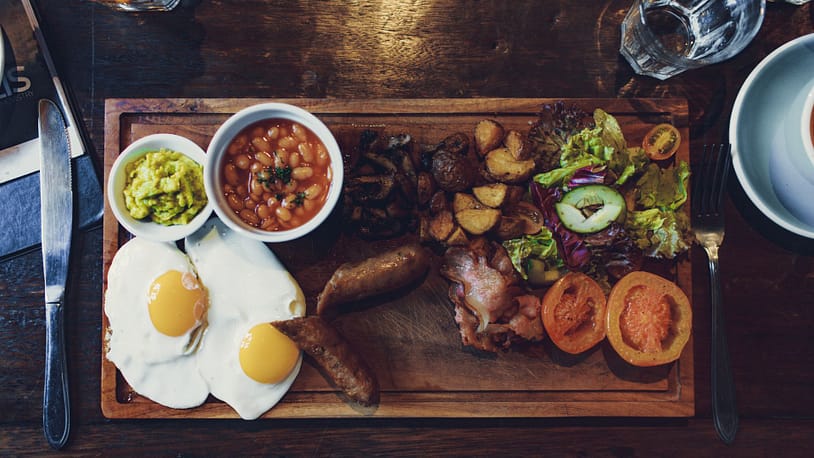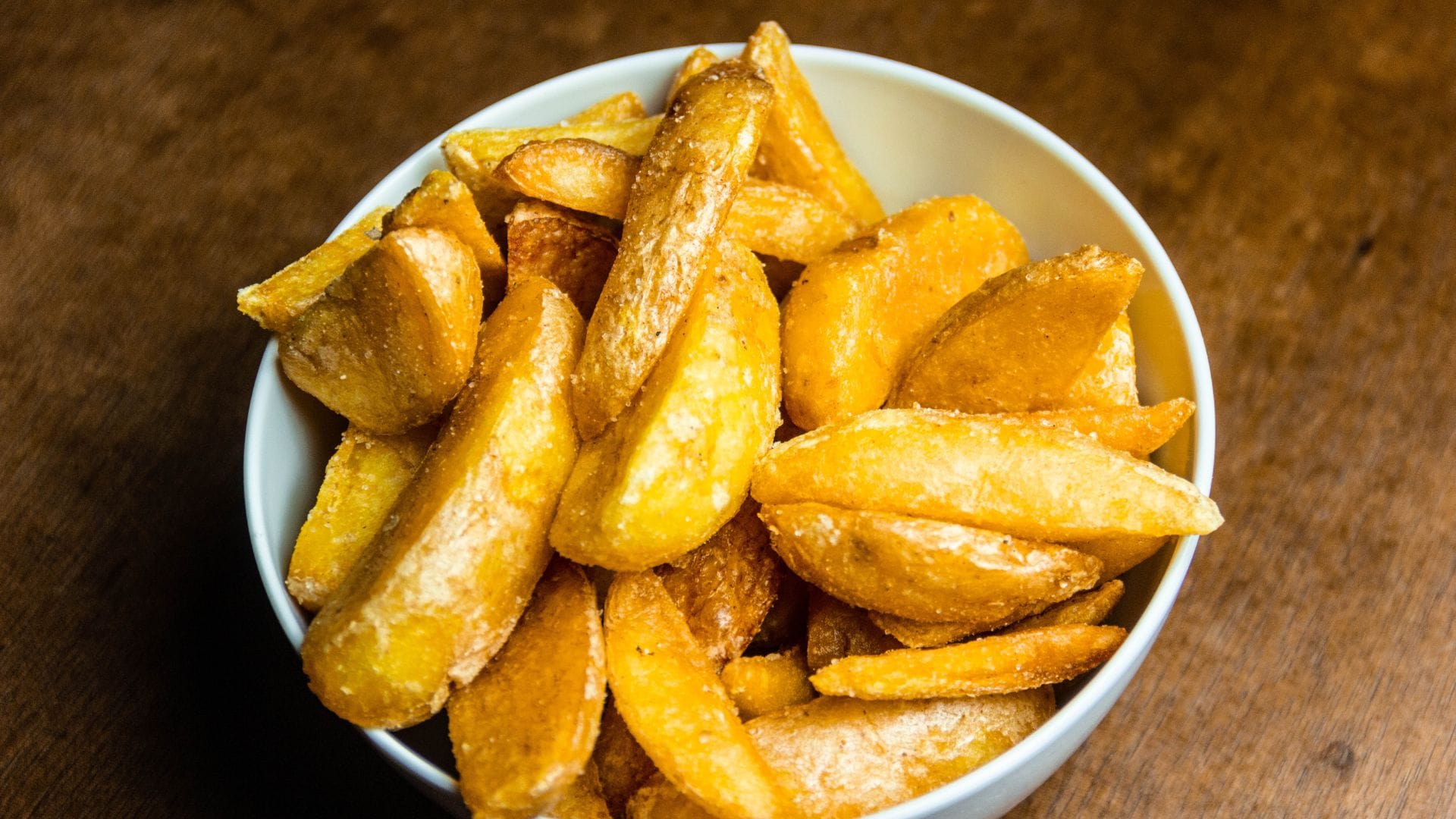Are you wondering if eating more potatoes can help you gain muscle when you’re squatting?
In this post, we’ll explore the role of carbohydrates and protein in muscle building, how to balance your diet, and whether potatoes can help you achieve your fitness goals when squatting. Let’s dive in!
Potatoes are a good source of carbohydrates and can provide energy for your workouts, but they alone won’t help you gain muscle. Squatting is a great exercise for building lower body strength and gaining muscle mass. However, to see results, you need to pair your workout routine with a proper nutrition plan. To build muscle, you need to consume enough protein to support muscle growth. Foods such as lean meats, fish, eggs, and dairy products are excellent sources of protein. Pairing protein with carbohydrates, like potatoes, can help provide energy for your workouts and support muscle recovery. Balance your diet with a mix of healthy proteins, carbohydrates, and fats to support your fitness goals.
Squatting is great for building lower body Potatoes are a good source of carbohydrates and energy.
Squatting is one of the most effective exercises for building lower body strength and gaining muscle mass. It targets the quads, glutes, and hamstrings, which are some of the largest and most powerful muscles in the body.
However, to see results, it’s essential to pair your workout routine with a proper nutrition plan.
While potatoes are a good source of carbohydrates and can provide energy for your workouts, they alone won’t help you gain muscle.
To build muscle, you need to consume enough protein to support muscle growth. Protein is the building block of muscle tissue, and without enough of it, your body won’t be able to repair and grow muscles after a workout.
Foods such as lean meats, fish, eggs, and dairy products are excellent sources of protein.
Plant-based protein sources such as lentils, beans, and tofu are also great options for those who follow a vegetarian or vegan diet.
The amount of protein you need will depend on your body weight, fitness goals, and activity level. As a general rule, aim to consume at least 0.8 grams of protein per pound of body weight per day.
Pairing protein with carbohydrates, like potatoes, can help provide energy for your workouts and support muscle recovery.
After a workout, your body needs carbohydrates to replenish glycogen stores, which provide energy for your muscles. Consuming carbohydrates with protein can also help stimulate muscle protein synthesis, which is the process of building new muscle tissue.
However, it’s essential to balance your diet with a mix of healthy proteins, carbohydrates, and fats to support your fitness goals.
Consuming too many carbohydrates can lead to weight gain, while not consuming enough healthy fats can negatively impact hormone production and overall health.
A registered dietitian can help you determine the right balance of macronutrients for your body and fitness goals.
While potatoes are a good source of carbohydrates, they alone won’t help you gain muscle.
To build muscle, you need to consume enough protein to support muscle growth and pair it with carbohydrates to provide energy for your workouts and support muscle recovery.
A balanced diet that includes a mix of healthy proteins, carbohydrates, and fats is essential to support your fitness goals.
Here is a chart table comparing the nutritional value of potatoes and the benefits of squats for building muscle:
Nutrient/ Benefit |
Potato (1 medium, baked with skin) |
Squats |
|---|---|---|
| Calories | 161 | Burn calories and increase metabolism |
| Carbohydrates | 36.6g | Provide energy for workouts |
| Protein | 4.3g | Build and repair muscle tissue |
| Fiber | 2.3g | Aid digestion and promote satiety |
| Vitamin C | 28% DV (Daily Value) | Boost immune system and support collagen production |
| Potassium | 26% DV | Regulate fluid balance and support muscle contractions |
| Iron | 10% DV | Transport oxygen to muscles for energy production |
| Calcium | 2% DV | Support muscle contractions and bone health |
As you can see, potatoes are a good source of carbohydrates, fiber, and certain vitamins and minerals that support overall health and physical performance. However, squats offer numerous benefits for muscle-building, such as increasing muscle activation, stimulating growth hormone release, and improving muscle endurance.
Therefore, it’s important to include both proper nutrition and exercise into your routine to maximize muscle gain and overall health.
You need to consume enough protein to support muscle growth to build muscle.
Protein is an essential macronutrient that plays a crucial role in building and repairing muscle tissue.
When you exercise, you create small tears in your muscles, and protein is needed to repair these tears and build new muscle tissue.
Without enough protein, your body won’t be able to recover properly from your workouts, and you won’t see the muscle growth you desire.
Foods such as lean meats, fish, eggs, and dairy products are excellent sources of protein. These foods contain all the essential amino acids that your body needs to build muscle.
Essential amino acids are those that your body can’t produce on its own and must be obtained through your diet.
Lean meats such as chicken, turkey, and beef are excellent sources of high-quality protein.
These meats are also rich in iron, which is essential for transporting oxygen to your muscles during exercise.
Fish, especially fatty fish like salmon, are also great sources of protein and omega-3 fatty acids, which can help reduce inflammation and improve muscle recovery.
Eggs are another great source of protein, and they’re also one of the most bioavailable sources of protein, meaning that your body can easily absorb and use the protein from eggs.
Dairy products like milk, cheese, and yogurt are also excellent sources of protein, and they’re also rich in calcium, which is essential for bone health.
It’s important to note that not all protein sources are created equal. Some sources of protein, such as red meat and processed meats, have been linked to an increased risk of heart disease, cancer, and other health issues. It’s important to choose lean sources of protein and incorporate a variety of protein sources into your diet.
The amount of protein you need will depend on your body weight, fitness goals, and activity level. As a general rule, aim to consume at least 0.8 grams of protein per pound of body weight per day.
However, if you’re trying to build muscle, you may need to consume more protein to support muscle growth.
Consuming enough protein is essential for building muscle. Foods such as lean meats, fish, eggs, and dairy products are excellent sources of protein that can help you achieve your fitness goals.
To maximize the benefits of protein, choose lean sources of protein and incorporate a variety of protein sources into your diet.
Here is a chart table showing the recommended daily protein intake for muscle growth, based on different activity levels:
Activity Level |
Recommended Protein Intake for Muscle Growth |
|---|---|
| Sedentary (little to no exercise) | 0.36 grams per pound of body weight |
| Endurance Exercise (moderate to high intensity cardio) | 0.5-0.65 grams per pound of body weight |
| Resistance Exercise (weightlifting, bodyweight exercises) | 0.7-0.8 grams per pound of body weight |
| Strength/Power Exercise (heavy weightlifting, intense training) | 0.8-1 gram per pound of body weight |
For example, if you weigh 150 pounds and engage in resistance exercise, you should aim to consume 105-120 grams of protein per day to support muscle growth. It’s important to spread your protein intake throughout the day and include a variety of protein sources to ensure you are getting all the essential amino acids your body needs.
It’s also worth noting that while protein is important for muscle growth, it’s not the only nutrient that matters. Consuming enough calories, carbohydrates, and fats is also crucial for providing energy and supporting overall health and performance.

Pairing protein with carbohydrates, like potatoes, can help provide energy for your workouts and support muscle recovery.
Protein is an essential macronutrient that plays a crucial role in building and repairing muscle tissue. It’s made up of amino acids, which are the building blocks of protein.
The body can’t produce these on its own and must obtain them from food sources such as lean meats, fish, eggs and dairy products.
Protein can be used to build muscle mass when you exercise regularly by consuming enough calories from carbohydrates or fat (or both) throughout the day so that your body has enough energy to perform at its best during workouts without breaking down existing stores of lean tissue for fuel instead of using what you’ve eaten recently as fuel source during exercise sessions.
Pairing Protein with Carbohydrates
Protein is an essential nutrient for building, maintaining and repairing muscle tissue. Carbohydrates are also important for providing energy during workouts and supporting muscle recovery after exercise.
After a workout, your body needs carbohydrates to replenish glycogen stores-the form of sugar that provides energy for your muscles.
Consuming carbohydrates with protein can also help stimulate muscle protein synthesis–the process of building new muscle tissue.
Protein-carbohydrate combinations include:
How Much Protein Do I Need?
The amount of protein you need will depend on your body weight, fitness goals and activity level. As a general rule, aim to consume at least 0.8 grams of protein per pound of body weight per day.
If you’re trying to build muscle and/or increase strength, then it’s recommended that you consume 1-2 grams per pound (or more) each day.
Balancing Your Diet
Protein, carbohydrates and fats are essential nutrients that your body needs to function properly. When you consume too much or too little of any one macronutrient, it can negatively impact your overall health and fitness goals.
When it comes to balancing your diet with a mix of healthy proteins, carbohydrates and fats, it’s important to speak with a registered dietitian who can help determine the right balance for you based on your body type and fitness goals.
Carbohydrates are an important part of a balanced diet and can help provide energy for your workouts. However, they alone won’t help you gain muscle.
To build muscle, you need to consume enough protein to support muscle growth and pair it with carbohydrates to provide energy for your workouts and support muscle recovery.
A balanced diet that includes a mix of healthy proteins (like fish), carbohydrates (such as potatoes) and fats is essential to support your fitness goals!
Final thoughts
While potatoes are a good source of carbohydrates, they alone won’t help you gain muscle. To build muscle, you need to consume enough protein to support muscle growth and pair it with carbohydrates to provide energy for your workouts and support muscle recovery.
However, incorporating potatoes into your diet can provide a healthy source of carbohydrates to fuel your workouts.
Here’s an example of a chart table that shows how much protein and carbohydrates you should consume based on your weight:
| Body Weight | Protein Intake | Carbohydrate Intake |
|---|---|---|
| 120 lbs | 96-120 grams | 120-180 grams |
| 150 lbs | 120-150 grams | 150-225 grams |
| 180 lbs | 144-180 grams | 180-270 grams |
| 210 lbs | 168-210 grams | 210-315 grams |
| 240 lbs | 192-240 grams | 240-360 grams |
As you can see from the chart, protein intake should increase as body weight increases to support muscle growth.
Carbohydrate intake should also increase to provide energy for workouts and support muscle recovery. Potatoes can be incorporated into your carbohydrate intake, but it’s important to balance your diet with a variety of healthy carbohydrate sources such as fruits, vegetables, and whole grains.
incorporating potatoes into your diet can provide a healthy source of carbohydrates to fuel your workouts. However, to build muscle, it’s important to consume enough protein and balance your diet with a variety of healthy carbohydrate sources. A registered dietitian can help you determine the right balance of macronutrients for your body and fitness goals.
Conclusion
In conclusion, potatoes can be a healthy source of carbohydrates to fuel your workouts when squatting.
However, to gain muscle, it’s important to consume enough protein and balance your diet with a variety of healthy carbohydrate sources.
Squatting is a great exercise to build lower body strength and muscle mass, but it’s important to fuel your body properly to see the best results.
Consulting with a registered dietitian can help you determine the right balance of macronutrients for your body and fitness goals. Remember, there’s no one-size-fits-all approach to nutrition and fitness, and finding the right balance for your body is key to achieving your goals.
Sources:

Hey there, it’s Mike Rrsq, the Editor-in-Chief over at Jsquat.com, and I’m absolutely obsessed with all things squat fitness! I’ve been lucky enough to get some serious recognition for my work in this field. With a solid background in the fitness and wellness industry, I’ve been there right from the get-go, helping shape this website into what it is today.
You see, I’m not just the boss around here; I’m also a passionate contributor. I love sharing my insights through my articles, and trust me, they’re not your run-of-the-mill stuff. Each piece I write is a labor of love, filled with my expertise and real-world experience in the fitness universe. So, if you’re into fitness and looking for some inspiration, you’re in the right place!


